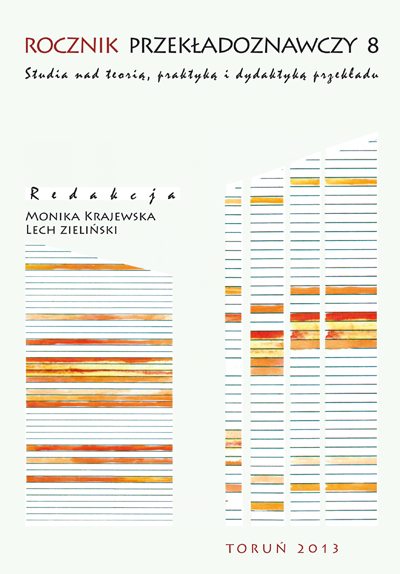Dydaktyka przekładu tekstów specjalistycznych w kontekście rozwoju kompetencji tłumaczeniowej
DOI:
https://doi.org/10.12775/RP.2013.009Słowa kluczowe
dydaktyka przekładu, kompetencja tłumaczeniowa, tekst specjalistyczny, przekład prawnyAbstrakt
Przed tłumaczami stoją obecnie wielkie wyzwania, sprostanie którym wymaga ciągłego poszerzania wiedzy, zapoznawania się z nowymi technologiami i technikami tłumaczenia czy też umiejętności poszukiwania potrzebnych informacji. W niniejszym artykule odniesiemy się zatem do przekładu tekstów specjalistycznych, w szczególności zaś do przekładu tekstów prawnych, z punktu widzenia dydaktyki przekładu, jak również zajmiemy się kwestią niezbędną dla wygenerowania dobrego przekładu, a mianowicie możliwością rozwoju kompetencji tłumaczeniowej z perspektywy dydaktycznej.Bibliografia
Albir, H.A., 2005,. „A aquisição da competência tradutória. Aspectos teóricos e metodológicos”, [w:] Competência em tradução.Cognição e discurso, A. Pagano, C. Magalhães, F. Alves (red.), Belo Horizonte, s. 10–42.
Alves, F., (red.), 2003, Triangulating Translation: Perspectives in Process Oriented Research, Amsterdam.
Alves, F., Gonçalves, J.L., 2003, „A relevance theory approach to the investigation of inferential processes in translation”, [w:] Triangulating translation: perspectives in process oriented research, F. Alves (red.), Amsterdam, s. 11–34.
Alves, F., 1995, Zwischen Schweigen und Sprechen: Wie bildet sich eine transkulturelle Brücke?: eine psycholinguistisch orientierte Untersuchung von Übersetzungsvorgängen zwischen portugiessischen und brasilianischen Übersetzern, Hamburg.
Anderson, J.R., 1983, The architecture of cognition, Cambridge.
Beeby, A., Ensinger, D.,Presas, M., (red.), 2000, Investigating Translation Competence, Amsterdam.
Bernardini, S., 2004, „The theory behind the practice: Translator training or translator education?”, [w:] Translation in Undergraduate Degree Programmes, K. Malmkjaer (red.), Amsterdam–Philadelphia, s. 17–29.
Chesterman, A., 1997, Memes of translation, Amsterdam.
Danks, J.H. i in., 1997, Cognitive processes in translation and interpreting, California.
Dreyfus, H.L., Dreyfus, S.E., 1986, Mind over Machine. The Power of Human Intuition and Expertise in the Era of the Computer, Oxford.
Englund Dimitrova, B., Expertise and Explicitation in the Translation Process, Amsterdam–Philadelphia.
Ericsson, K.A., Smith, J., 1991, „Prospects and Limits of the Empirical Study of Expertise: An Introduction”, [w:] Towards a General Theory of Expertise. Prospects and Limits, K.A. Ericsson, J. Smith (red.), Cambridge,s. 1–38.
Gambier, Y., 2005, Translation and Interpretation – Training and Research, Turku.
Gerloff, P., 1986, „Second Language Learners’ Reports on the Interpretive Process”, [w:] Interlingual and Intercultural Communications. Discourse and Cognition in Translation and Second Language Acquisition Studies, J. House, S. Blum-Kulka (red.), Tübingen, s. 243–262.
Gonzalez Davies, M., 2004, Multiple Voices in the Translation Classroom. Activities, Tasks and Projects, Amsterdam–Philadelphia.
Hałas, B., 1995, Terminologia języka prawnego, Zielona Góra.
Hönig, H.G., 1995, Konstruktives Übersetzen. (Studien zur Translation 1), Tübingen.
Jääskeläinen, R., 1989, „The Role of Reference Material in Professional vs. Non-professional Translation”, [w:] Empirical Studies in Translation and Linguistics. (Studies in Languages 17)], S. Tirkkonen-Condit, S. Condit, S. Joensuu (red.), s. 175–198.
Jääskeläinen, R., 1993, „Investigating Translation Strategies”, [w:] Recent Trends in Empirical Translation Research, S. Tirkkonen-Condit, J.Laffling, Joensuu (red.), s. 99–120.
Jääskeläinen, R., 1996, „Hard work will bear beautiful fruit. A Comparison of Two Think-Aloud Protocols”, Meta, 46(1), s. 60–74.
Jääskeläinen, R., 1999, Tapping the Process. An Explorative Study of the Cognitive and Affective Factors Involved in Translating. (Publications in the Humanities 22), Joensuu.
Jääskeläinen, R., 2002, „Think-aloud Protocol Studies into Translation. An Annotated Bibliography”, [w:] Target, Vol. 14, No. 1, s. 107–136.
Jääskeläinen, R., Tirkkonen-Condit, S., 1991, „Automatised Processes in Professional vs. Nonprofessional Translation: A Think-aloud Protocol Study”, [w:] Empirical Research in Translation and Intercultural Studies: Selected Papers of the TRANSIF Seminar, S. Tirkkonen-Condit (red.), Tübingen, s. 89–109.
Jadacka, H., 1996, „Styl tekstów prawnych na tle innych odmian polszczyzny”, [w:] Przegląd Legislacyjny Nr 3.s. 112-128.
Jopek-Bosiacka, A., 2006, Przekład prawny i sądowy, Warszawa.
Kelly, D., 2005, A Handbook for Translator Trainers, Manchester.
Kiraly, D.C., 1995, Pathways to Translation: Pedagogy and Process, Kent.
Kiraly, D., 2000, A Social Constructivist Approach to Translator Education. Empowerment from Theory to Practice, Manchester.
Kościałkowska-Okońska, E., 2007, „Analiza wyzwań i zagrożeń dla dydaktyki przekładu na kierunkach filologicznych. Przedefiniowanie roli nauczyciela i studenta”, [w:] Współczesne kierunki analiz przekładowych, M. Piotrowska (red.), Kraków, s. 261–267.
Kościałkowska-Okońska, E., 2012, „Kompetencja tłumaczeniowa: modele teoretyczne a rzeczywistość”, [w:] Tłumacz: sługa, pośrednik, twórca? ,M. Guławska-Gawkowska, K. Hejwowski, A. Szczęsny (red.), Warszawa, s. 119–129.
Krings, H.P., 1986, Was in den Köpfen von Übersetzern vorgeht, Tübingen.
Krings, H.P., 1988, „Blick in die »Black Box« – Eine Fallstudie zum Übersetzungsprozeß bei Berufsübersetzern”, [w:] Textlinguistik und Fachsprache. Akten des Internationalen übersetzungswissenschaftlichen AILA-Symposions, R. Arntz, R. Olms (red.), Hildesheim, s. 393–412.
Kußmaul, P., 1995, Training the Translator, Amsterdam.
Lörscher, W., 1991, Translation Performance, Translation Process, and Translation Strategies. A Psycholinguistic Investigation, Tübingen.
Malmkjær, K., (red.), 1998, Translation and Language Teaching. Language Teaching and Translation, Manchester.
Malmkjaer, K., (red.), 2004, Translation in Undergraduate Degree Programmes, Amsterdam–Philadelphia. PACTE 2000, „Acquiring Translation Competence: Hypotheses and Methodological Problems in a Research Project”, [w:] Investigating Translation Competence, A. Beeby, D. Ensinger, M. Presas (red.), Amsterdam, s. 99–106.
Sarcevic, S., 1997, New Approach to Legal Translation, the Hague.
Schäffner, C., Adab, B., (red.), 2000, Developing translation competence, Amsterdam.
Séguinot, C., 1989, The translation process, Toronto.
Sternberg, R.J., 1999, Cognitive Psychology, Fort Worth.
Tiersma, P.M., 1999, Legal Language, Chicago.
Tirkkonen-Condit, S., 1990, „Professional vs. non-professional translation: a think-aloud protocol study”, [w:] Learning, Keeping and Using Language, M.A.K. Halliday, J. Gibbons, H. Nicholas (red.), Amsterdam, s. 381–394.
Tirkkonen-Condit, S., 1992, „The Interaction of World Knowledge and Linguistic Knowledge in the Processes of Translation”, [w:] Translation and Meaning, 2, B. Lewandowska-Tomaszczyk, M. Thelen (red.), Maastricht, s. 433–440.
Tirkkonen-Condit, S., 1992, „The interaction of world knowledge and linguistic knowledge in the process of translation: a think-aloud protocol protocol study”, [w:] Translation and Meaning, 2B, Lewandowska-Tomaszczyk, M. Thelen (red.), s. 433–440. Maastricht: Euroterm.
Toury, G., 1995, Descriptive Translation Studies and Beyond, Amsterdam.
Wojtak, M., 2001, „Styl urzędowy”, [w:] Współczesny język polski, J. Bartmiński (red.), Lublin, s. 141–149.
Pobrania
Opublikowane
Numer
Dział
Statystyki
Liczba wyświetleń i pobrań: 1203
Liczba cytowań: 0



